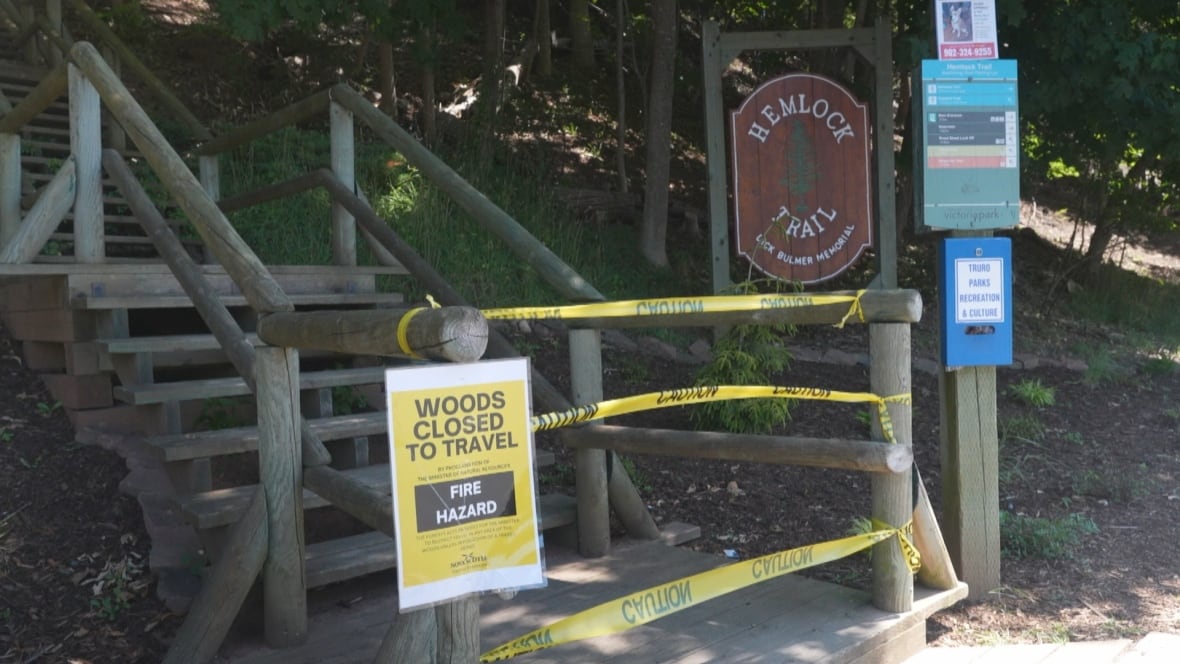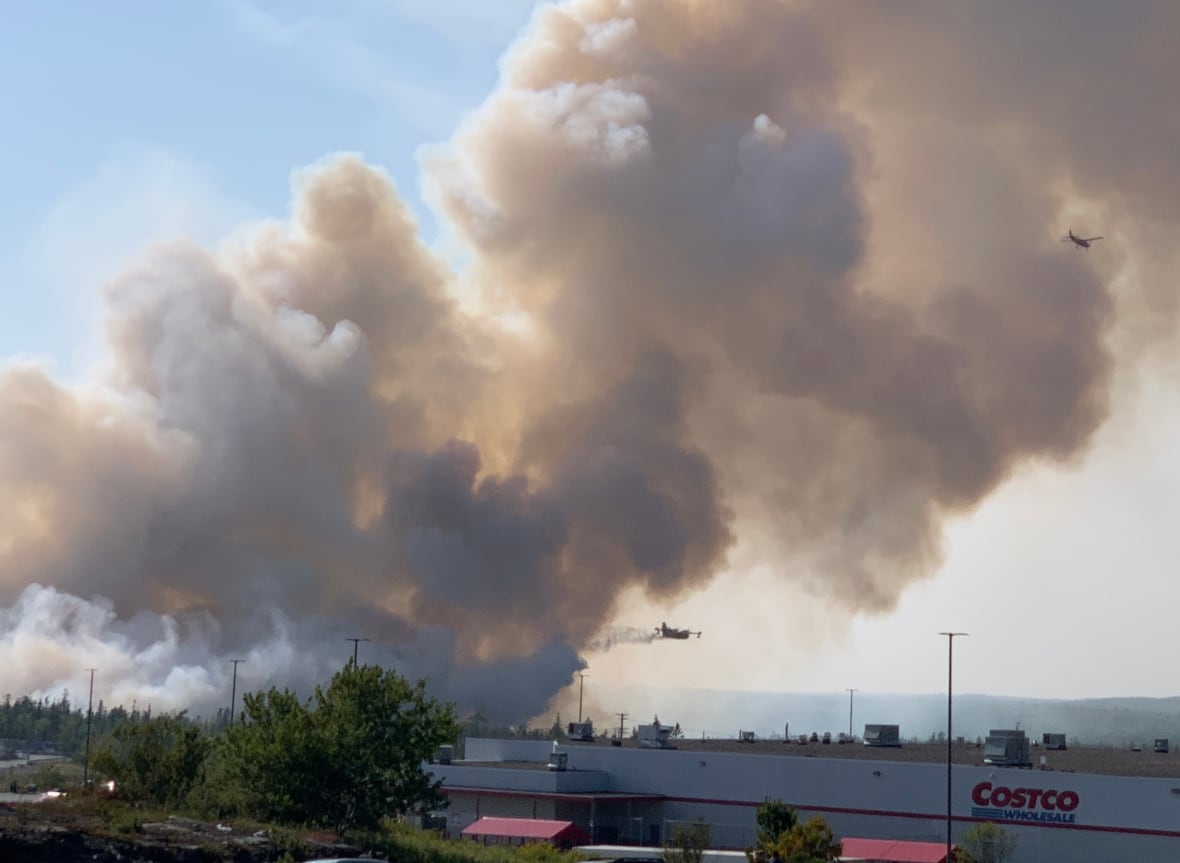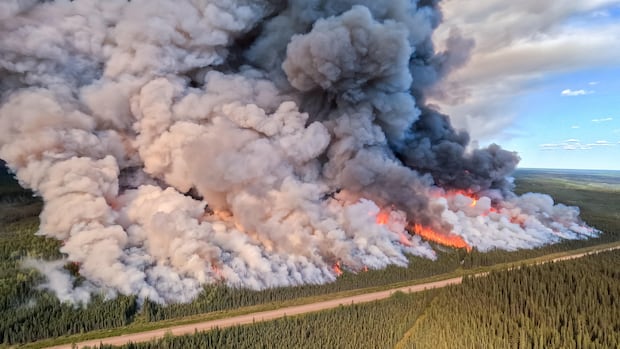Stay out of the woods. No hiking. No fishing. No camping. Don’t ride your ATV. These were the messages this past summer in Atlantic Canada, as provinces dealt with high temperatures and dry conditions.
But those restrictions caused friction in the region — and across Canada — which Eric Kennedy says shouldn’t be a surprise.
“Fire has always been political,” Kennedy, an associate professor of disaster and emergency management at York University, told What On Earth host Laura Lynch.
“When we look at fire history, there have always been questions about whose values get protected, about what fires we choose to fight, which ones we don’t [and] how we invest money in fire preparedness.”
New Brunswick, Nova Scotia and Newfoundland and Labrador all found themselves battling out of control wildfires this summer. In response, Nova Scotia and New Brunswick banned fires and implemented restrictions on access to Crown land, with many municipalities doing the same.
But some have called the restrictions a violation of the Canadian Charter of Rights and Freedoms, saying they prohibit activity that doesn’t risk starting fires.
Kennedy, who studies how governments respond to emergency situations, says it will be important for the provinces to work together to figure out how they plan to respond, as wildfire season becomes longer and more deadly.
Pushback
When Nova Scotia first announced its restrictions on Crown land access in August — including an increased fine for those who violated it — the response was swift, with people questioning how walking their dog or going for a bike ride could ignite a fire.
“It’s one thing for somebody to go outside and light up a cigarette and throw a butt on the ground. It’s another thing for somebody to want to take a hike in the woods,” Julissa Stewart of Louisdale, N.S., told CBC News earlier this month.
There’s been criticism and controversy surrounding measures put in place by the Nova Scotia government to keep people out of the woods amid high temperatures and very dry conditions. A Cape Breton man is protesting the restrictions by violating them and he’s now been slapped with a major fine. Kyle Moore has the story.
After the restrictions were put in place, army veteran Jeff Evely publicly defied the province’s rule around walking in the woods, and was handed a ticket of $28,000, which he plans to challenge in court.
The Canadian Constitution Foundation, a non-profit organization which also challenged Ottawa’s use of the Emergencies Act to clear convoy protesters in 2022, also plans to challenge Nova Scotia’s province wide ban.
But Fred Delorey, chair of North Star Public Affairs, an agency that specializes in politics and public policy, says most people he’s talked to in Nova Scotia support the restrictions.
“We have to understand that sometimes the governments have to make tough decisions that puts the people first and the province first. And … to me it was a no-brainer,” said Delorey, who also managed the national Conservative campaign in 2021.
Instead, he says much of the pushback has come from groups outside the province who either believe that people should be able to travel freely, or those who feel this is an act of government overreach.
Lifting restrictions
In New Brunswick, industrial work in forested areas was put on pause, which meant woodlot owners couldn’t cut and harvest their timber.
Rick Doucett, president of the New Brunswick Federation of Woodlot owners, said his members understood and complied with the province’s restrictions, but it meant a huge financial hit for many people.
“The people who work out there, I think they have a great understanding that the province is doing the right thing in shutting things down,” Doucett told Shift host Vanessa Vander Valk.
“The challenge of course for them is they can’t pay their bills. And so that’s where maybe we need to come up with a way for people to do the right thing under the extreme circumstances, but also not be hit so hard financially.”

Some restrictions have since been lifted. New Brunswick reopened Crown land to the public on Monday, which had been closed since Aug. 10. Many cities across the province followed suit, opening access to public parks and trails, though there is still a burn ban throughout the province.
Nova Scotia is also still under a burn ban, and has restrictions on entering Crown land, as crews continue to battle dangerous fires in Annapolis County.
But even once those restrictions are lifted, Kennedy says that won’t be the end of the conversation, as wildfires are expected to be an annual challenge.
“We might need to think creatively about how we approach these restrictions. Because what’s palatable for one weekend in a season might not be something that communities are really willing to live with for two weeks, four weeks, six weeks of the season,” said Kennedy.
Shift – NBWoodlot Restrictions
People who make their living from woodlots have been unable to work, due to fire-prevention restrictions. We’ll look at the impact on business, and the kind of help people in the industry are looking for.
‘A people problem’
Kennedy says it can be easy to imagine wildfires as a problem that can be solved by technology, such as better equipment or more fire bombers.
But, he says, both those who are frustrated with the restrictions, and those making the restrictions, need to remember the people involved. He also says no politician is excited about having to restrict people’s movement.
“Fire is fundamentally a people problem. It’s a values problem. It’s the question of what we care about, how we prioritize it, and how we choose to come up with different creative solutions together,” said Kennedy.

Kennedy says it’s also important for governments to be transparent about why exactly restrictions are being put in place.
“I do think it’s really important that agencies empathetically understand where some of this resistance comes from and work to build trust and understanding in their communications,” said Kennedy.
“Just telling someone a rule, ‘Here, you can’t do this, you have to trust us on it,’ is never going to go over well.”
This can look like having staff in communities, so the news is coming from a trusted person and not a press release. Additionally, it can come in the form of education on why restrictions are being put in place.
Or, rather than focusing on rules, Kennedy says we could consider potential ways to make some outdoor activities safer through mitigation efforts.
“Perhaps we can be a little bit less restrictive with the rule regimes by investing in some of the infrastructure and tending to some of environments in ways that create safe places for fires or fishing.”






